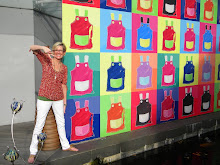Thursday, August 25, 2016
After Thoughts: Fourteenth Sunday after Pentecost
Luke 13:10-17
In the book Community by Peter Block, he writes that for community to happen “…we must be willing to trade their [the communities’] problems for their possibilities.” Oh, but how much easier is it to keep one another in our places? It can be much more comfortable that way. Like in this reading from Luke. A woman crippled for 18 years. We know what to do with her, all of those less fortunate than us. Have pity on her, give her some of our abundance, a tiny portion, and then pat ourselves on the back for our charity. Why do we care how long she’s locked up in her distress, because, as long as she is, we know what to do with her. But what happens if she is healed? What happens if she is no longer dependent on us? What happens if she is able to stand up straight, look us in the eyes, bring all of her gifts to the world? No longer an object of pity, but a human being to be encountered in relationship. Yikes!! That can get really scary.
That is exactly what happened when Jesus healed this woman on the Sabbath. He triggered several hot buttons. So what was going on? Let’s unpack this a bit:
v1: Now Jesus was teaching…and just then a woman appeared…when Jesus saw her. Now, just then, when. There’s a time element to this lesson. No waiting around. When we see something, or someone, that needs us, help now. But “nowness” can be threatening because it is so uncontrollable. Earthly power and authority prefer to have a committee meeting or get a legal opinion first because action changes things. And change can be frightening, intimidating, threatening.
v13: Jesus laid his hands on her. It’s not like he over-exerted himself to heal this woman. He simply touched her. And yet the leader was so upset by this as to deem it “work” and insist that Jesus was violating the Sabbath. Funny, how in the midst of great joy – a woman who had been around them for the past 18 years, bent and crippled, now standing upright – that all he could see was the violation of the law – a law that had been given to create community was turned upside down to empower exclusion.
v14: The leader continues to carry on, insisting that people can come any of those other six days, but not the Sabbath. So what do you imagine he thought the Sabbath was for? He’s saying that healing can happen on any day but the Sabbath? That people can be helped, but not on the Sabbath? Jesus gave it to us plain and simple: love God, love each other. When we over-emphasize the first part and omit the second part, our worship becomes idolatry. We got locked into the traditions, rules, and requirements – all human-made – that can actually separate us from God. When we over-emphasize the second part, we run the danger of becoming social activists with an over-reliance on our ability to save the world.
v15: Jesus does it again. Uses the “h” word. Here they are saying one thing, and yet doing another. Jesus has to point out that they care enough for their animals to untie and water them on the Sabbath. How can they possibly turn away a fellow human, a sister, a daughter of Abraham who needs to be set free and given Living Water? Well, maybe because the animals are their material goods, their source of wealth. Of course, they will look after their assets and best interests, even on the Sabbath. But what about caring for one another? It can be easy to use the rules to justify our actions, our lack of involvement, our complacency, even to be exclusive and shut others out. But Jesus will not let us get by with that.
So, to recap, lessons learned as I re-read this today:
Now is the time.
It doesn’t take that much for healing to occur, just reach out and connect with a fellow human being. God will do the rest.
Don’t use the system, tradition, rules, whatever we want to call it, to exclude others from receiving God’s grace. The table is ready. All are welcome.
Subscribe to:
Post Comments (Atom)

No comments:
Post a Comment